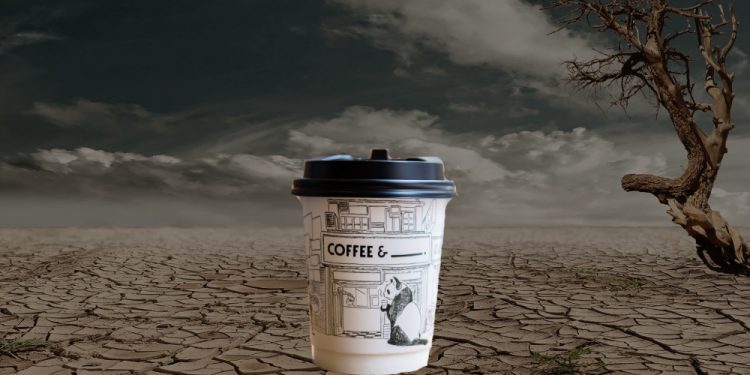Quebec City: Global coffee consumption has been increasing steadily for almost 30 years.
With a daily average consumption of 2.7 cups of coffee per person, coffee is one of the most popular drinks in the world.
It is estimated that around two billion cups of coffee are consumed daily worldwide.
This demand has led to considerable diversification in the ways of preparing coffee as well, including the creation of coffee capsules.
The popularity of these capsules has divided the public opinion because this method of preparation, which uses single-use individual packaging, is harmful to the environment.
As researchers working on assessing the environmental impacts of products and services, we often discuss coffee’s carbon footprint.
We decided to study the carbon footprint of several techniques used to prepare coffee at home, and it turns out that coffee capsules aren’t the biggest carbon culprits.
The life cycle of coffee
The pollution resulting from the preparation of coffee at home is just the tip of the iceberg.
Before you can enjoy a cup of coffee, it goes through several steps, starting from the agricultural production of the coffee beans, their transport, the roasting and grinding of the beans, right up to the heating of the water for the coffee and the washing of the cups it is poured in.
These steps, common to all modes of coffee preparation, consume resources and emit greenhouse gases (GHG).
To adequately compare the carbon footprint of several coffee preparation methods, it is important to consider their entire life cycle: from the production of coffee, through the manufacture of packaging and machinery, to the preparation of coffee and the waste produced.
Comparing four coffee preparation methods
We decided to study this further and conducted an extensive literature review on the subject. We then measured the carbon footprint of coffee by comparing four methods of preparing 280 millilitres of coffee, namely:
1) Traditional filter coffee (25 grams of coffee)
2) Encapsulated filter coffee (14 grams of coffee)
3) Brewed coffee (French press) (17 grams of coffee)
4) Soluble coffee (12 grams of coffee), also known as instant coffee
Our analysis clearly showed that traditional filter coffee has the highest carbon footprint, mainly because a greater quantity of coffee powder is used to produce the amount of coffee.
This process also consumes more electricity to heat the water and keep it warm.
When consumers use the recommended amounts of coffee and water, soluble coffee appears to be the most environmentally friendly option.
This is due to the low amount of soluble coffee used per cup, the kettle’s lower electricity consumption compared to a coffee maker and the absence of organic waste to be treated.
On the other hand, when consumers use a 20 per cent surplus of coffee and heat twice the water needed (which is often the case), coffee capsules seem to be the best option.
Why? Because the capsules allow you to optimise the amount of coffee and water per consumption.
Compared to traditional filter coffee, drinking a capsule filter coffee (280 ml) saves between 11 and 13 grams of coffee.
Producing 11 grams of Arabica coffee in Brazil emits about 59 grams of CO2e (CO2 equivalent).
This value is much higher than the 27 grams of CO2e emitted for manufacturing of coffee capsules and sending the generated waste to a landfill.
These figures give an idea of the importance of avoiding overusing and wasting coffee.
Coffee production
Regardless of the type of coffee preparation, coffee production is the most GHG-emitting phase.
It contributed to around 40 per cent to 80 per cent of the total emission. There are many reasons for this.
The coffee plant is a small stunted tree or shrub that was traditionally grown in the shade of the forest canopy.
The modernisation of the sector led to the transformation of many coffee plantations into vast fields that were fully exposed to the sun.
This added the need for intensive irrigation, fertilization systems and the use of pesticides.
This mechanisation, irrigation and use of nitrous oxide-emitting fertilisers — the production of which requires large quantities of natural gas — greatly contribute to coffee’s carbon footprint.
Reducing coffee’s carbon footprint
At the consumer level, beyond reducing coffee consumption, avoiding wasting coffee and water is the most effective way to reduce the carbon footprint of traditional, brewed and soluble coffees.
Coffee capsules avoid the overuse of coffee and water.
However, the convenience of capsule machines can lead consumers to double their coffee consumption, thus making this environmental advantage redundant.
Consumers should also be aware of the capsule recycling options in the city where they live to avoid it getting sent to a landfill instead of a recycling facility.
Better yet, they should switch to reusable capsules.
If you live in a province or country with carbon-intensive electricity production, not using the coffee maker’s hot plate and rinsing the cup with cold water can help reduce carbon footprint.
The electricity used to wash a cup of coffee in Alberta, a high-carbon electricity production province, emits more carbon (29 grams CO2e) than producing a coffee capsule and sending it to landfill (27 grams CO2e). In Québec, thanks to hydroelectricity, washing your cup in a dishwasher has a negligible impact (0.7 grams of CO2e per cup).
By the way, don’t forget to fill your dishwasher!
Shared responsibilities
Limiting your contribution to climate change requires an adapted diet, and coffee is no exception.
Choosing a mode of coffee preparation that emits less GHGs and moderating your consumption are part of the solution.
However, more than half of the carbon footprint of coffee comes from the steps taken by coffee producers and suppliers.
They must take action to reduce the environmental and social impacts of coffee production.
Our research reveals that assessments based on a life cycle analysis, or the holistic vision, of products like coffee make it possible to challenge our intuitive reasoning, which is sometimes misleading.
So instead of avoiding products based on speculation, we need to take a holistic look at our own consumption habits.
Change begins at home.
By- Luciano Rodrigues Viana, Doctorant en sciences de l’environnement, Département des sciences fondamentales, Université du Québec à Chicoutimi (UQAC), Charles Marty Adjunct professor UQAC, Jean-François Boucher Professeur, Eco-consulting UQAC and Pierre-Luc Dessureault Assistant researcher UQAC
– The Conversation






































